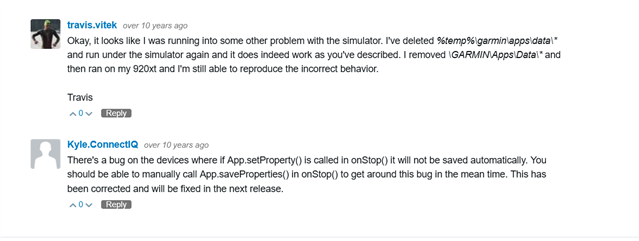I am working on an app that will intentionally get into situations where it will crash. My intention is to save the status before calling the code that might crash, and then when the app is started again it'll be able to display data that was saved.
Currently I'm trying to save 2 numbers and a boolean:
function foo() as Void {
setConfig("sport", self.sport);
setConfig("subSport", self.subSport);
setConfig("crashed", true);
session = ActivityRecording.createSession({
:name => "" + self.sport + ":" + self.subSport,
:sport => self.sport as Activity.Sport,
:subSport => self.subSport as Activity.SubSport,
});
session.start();
session.stop();
setConfig("crashed", false);
}
My problem is that the config is only written to the properties if I exit with System.exit() but not when (well my intention: before) there's a crash. Also the errors that cause the crash are not catchable exceptions :(
Any idea how can I make this work?
(:no_properties, :no_ciq_2_4_0, :inline) // NOTE: forbidden to set properties in background
function setConfig(key as PropertyKeyType, val as PropertyValueType) as Void {
Application.getApp().setProperty(key, val);
}
(:properties, :ciq_2_4_0, :inline) // NOTE: forbidden to set properties in background
function setConfig(key as PropertyKeyType, val as PropertyValueType) as Void {
Properties.setValue(key, val);
}





